Carl von Voit
This article includes a list of references, related reading, or external links, but its sources remain unclear because it lacks inline citations. (February 2022) |
Carl von Voit | |
|---|---|
 Carl von Voit | |
| Born | 31 October 1831 |
| Died | 31 January 1908 (aged 76) |
| Nationality | German |
| Alma mater | University of Munich |
| Known for | dietetics |
| Scientific career | |
| Fields | physiology |
Carl von Voit (31 October 1831 – 31 January 1908) was a German physiologist and dietitian.
Biography
[edit]Voit was born in Amberg, the son of August von Voit and Mathilde Burgett. From 1848 to 1854 he studied at the universities of Munich and Würzburg. At Munich, his teachers were Justus von Liebig and Max Joseph Pettenkofer, and at Würzburg, he was a pupil of Albert von Kölliker. In 1855 he furthered his education at the University of Göttingen under chemist Friedrich Wohler, and in 1856/57 served as an assistant to Theodor von Bischoff in Munich. In 1857, he obtained his habilitation, and from 1863 was a full professor of physiology, as well as curator of the physiological collection at the University of Munich.[1]
Contributions
[edit]Carl von Voit is considered by many to be the "father" of modern dietetics. As a chemist and physiologist, he found that the amount of nitrogen in excreted urea is a measure for the protein turnover. Using a respiration chamber, he could characterize the significance of individual nutrients, known as Voitsche Kostmaß.
He was also a successful teacher, attracting international students to the University of Munich and thus significantly influencing the US nutritionist, among others. One of his better known German pupils was Max Rubner.
Personal life
[edit]In 1860, Voit married Laura von Hößlin (1831-1910) in Augsburg. She was the younger sister of his stepmother Ottilie. They had six children Karoline (b. 1862), Friedrich (1863–1944), Emilie (1864-1903; married name Steinheil), Bertha (b. 1866), Louise Auguste (b. 1868) and Johanna (b. 1870).[2] His grand daughter via Emilie was Elsbeth Steinheil, the first German woman to graduate in mechanical engineering, qualifying in 1917 from the Technical University of Munich.[3]
Carl von Voit died in Munich on 31 January 1908.
The German Nutrition Society has been awarding the Carl-von-Voit-medal since 1961.
Works
[edit]- Die Gesetze der Ernährung des Fleischfressers (Leipzig 1860)
- Über die Wirkung des Kochsalzes, des Kaffees und der Muskelbewegung auf den Stoffwechsel (Munich 1860)
- Über die Kost in öffentlichen Anstalten (Munich 1876)
- Untersuchung der Kost in einigen öffentlichen Anstalten (Munich 1877)
- Über die Entwickelung der Erkenntnis (Munich 1879)
- Physiologie des allgemeinen Stoffwechsels und der Ernährung (volume 6, first section of Ludimar Hermann's "Handbuch der Physiologie", Leipzig 1881)
- Zeitschrift für Biologie (as publisher, together with Ludwig von Buhl und Max von Pettenkofer)
References
[edit]- Lusk, G (February 1908). "CARL VON VOIT". Science. 27 (686): 315–316. Bibcode:1908Sci....27..315L. doi:10.1126/science.27.686.315-a. PMID 17770692.
- Sigerist, H E (1989). "The history of dietetics. 1941". Gesnerus. 46 Pt 3–4: 249–56. doi:10.1163/22977953-0460304007. PMID 2696668.
- Heyll, U (December 2007). "[The "Fight over the Protein Minimum". The conflict between scientific nutrition teaching and food reform in 19th and 20th century Germany]". Dtsch. Med. Wochenschr. 132 (51–52): 2768–73. doi:10.1055/s-2007-1012767. PMID 18074324.
- ^ VOIT, Carl Michael von Voit drw.saw-leipzig.de
- ^ "GEDBAS: Database 45719". gedbas.genealogy.net. Retrieved 2024-09-17.
- ^ Fuchs, Margot (1994). Wie die Väter so die Töchter: Frauenstudium an der Technischen Hochschule München 1899 - 1970. FAKTUM. München: Tech. Univ. ISBN 978-3-929391-07-7.
External links
[edit]
